#Yumeko Aizome
Explore tagged Tumblr posts
Text



Japanese Girls at the Harbor | 港の日本娘 (1933) dir. Hiroshi Shimizu
#japanese girls at the harbor#minato no nihonmusume#港の日本娘#michiko oikawa#yumeko aizome#hiroshi shimizu#dailyworldcinema#1933#1930s#*
43 notes
·
View notes
Text
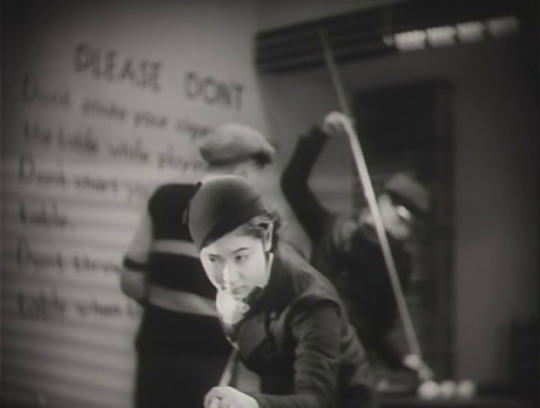
Kinuyo Tanaka in Dragnet Girl (Yasujiro Ozu, 1933)
Cast: Kinuyo Tanaka, Joji Oka, Sumiko Mizukubo, Koji Mitsui, Yumeko Aizome, Yoshio Takayama, Koji Kaga, Yasuo Nanjo. Screenplay: Tadao Ikeda, based on a story by Yasujiro Ozu (as James Maki). Cinematography: Hideo Shigehara. Art direction: Yonekazu Wakita.
Yasujiro Ozu clung to silent film for a long time, but who needs sound when you and your cinematographer, Hideo Shigehara, can use the camera as eloquently as they do in Dragnet Girl? Early in the film, the camera explores an office setting, panning over rows of young women at typewriters, clocks slowly ticking away the workday, and rows of men's hats hanging in a hallway. In the last take, one of the hats drops from its hook, as if impatient for quitting time. One of the typists, Tokiko (Kinuyo Tanaka), is summoned from her machine to the office of the president, where she finds his son, Okazaki (Yasuo Nanjo), who has been putting the moves on her by giving her jewelry, this time a ruby ring. She shrugs off his advances but accepts the ring -- she's living with a gangster, an ex-boxer named Joji (Joji Oka), and it's his world that she prefers. This is one of Ozu's forays into the underworld made familiar to us by Hollywood, and it's permeated with echoes of Warner Bros. movies of the 1930s. American culture creeps in everywhere: Even the rules of conduct in a pool hall are written in English on the wall, and in the boxing gym that Joji frequents a sign proclaims the virtues of "The Manly Art of Self-Defense." When an eager young kid named Hiroshi (Koji Mitsui) shows up in the gym wanting to become a champion fighter, Joji takes an interest in him, and through him meets his sister, Kazuko (Sumiko Mizukubo), who works in a record store that prominently features the RCA Victor mascot, Nipper. Tokiko gets jealous of Joji's interest in Kazuko, but when she decides to emulate her rival by taking up knitting and other domestic pursuits, she and Joji quarrel. She storms out, but later returns to persuade Joji that it might be a good thing to go straight. Things get complicated, however, when Hiroshi, Joji's protégé, steals money from the cash register at his sister's store. Joji persuades Tokiko that they should pull off one last heist, robbing from the office where Tokiko works to get cash so Hiroshi can pay back what he stole. Ah, but crime does not pay. All of this melodramatic business is elevated not only by Ozu's sure-footed direction and attention to visual detail but also by the performances, especially that of Tanaka, who once again shows why she should be honored as one of the great film actresses. She has Bette Davis's toughness combined with Lillian Gish's gift for pathos.
5 notes
·
View notes
Photo
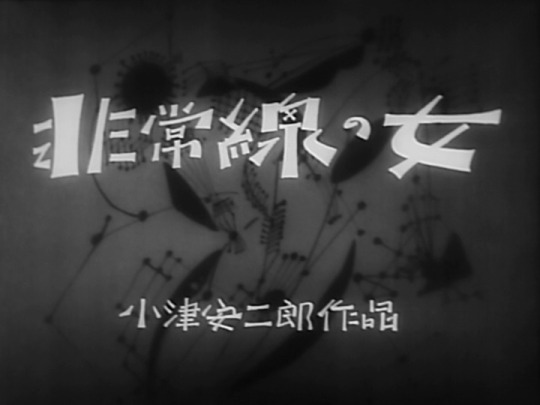
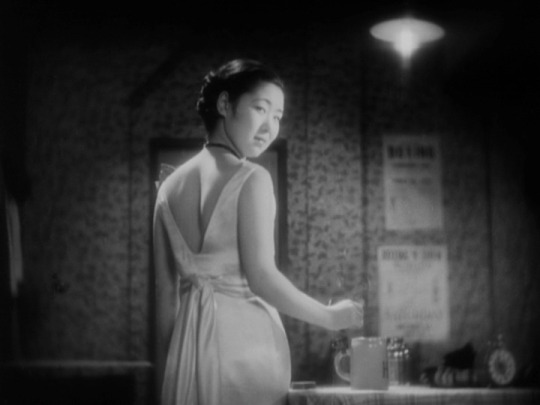

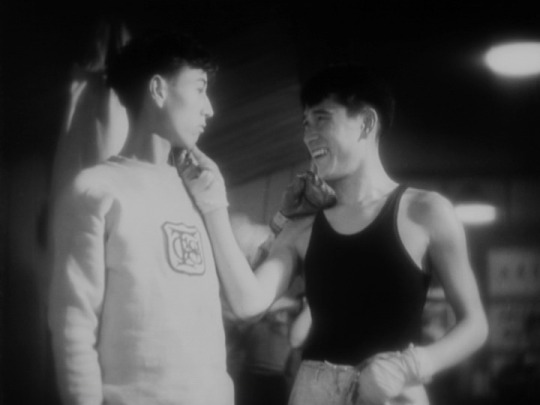
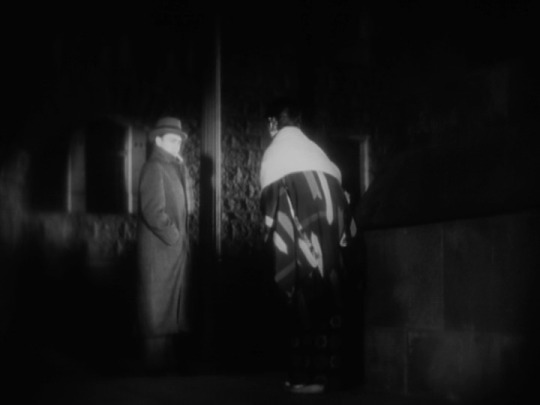


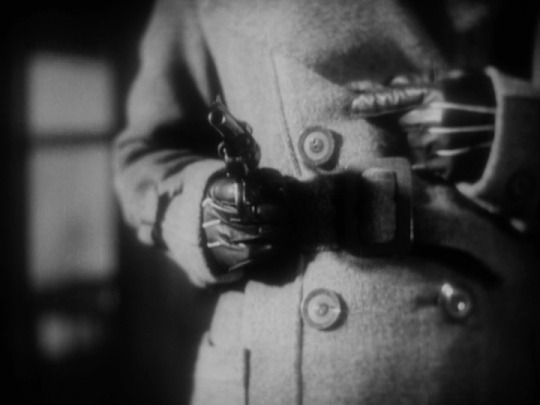
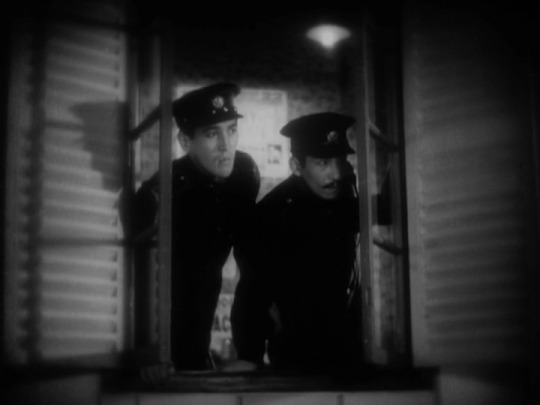
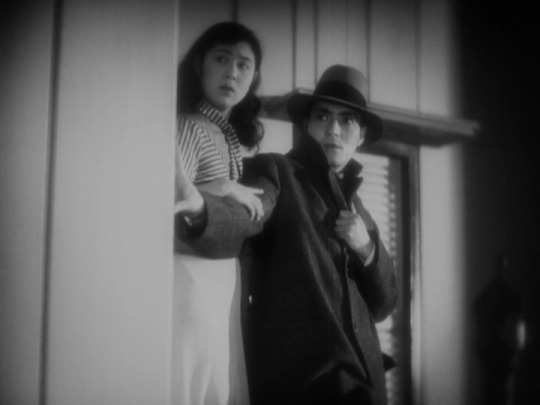
Dragnet Girl / Hijōsen no onna (1933, Yasujirō Ozu)
非常線の女 (小津安二郎)
1/10/21
#Dragnet Girl#Hijosen no onna#Yasujiro Ozu#Kinuyo Tanaka#Joji Oka#Sumiko Mizukubo#Koji Mitsui#Yumeko Aizome#Yoshio Takayama#Koji Kaga#Yasuo Nanjo#Japanese#crime#drama#silent#romance#gangster#yakuza#boxing#typists#siblings#noir#dragnet#robbery#thieves#30s#homoerotic
28 notes
·
View notes
Text

yumeko aizome and setsuko hara in a ball at the anjo house (1947)
258 notes
·
View notes
Text

Yumeko Aizome, Kimiyo Otsuka y desconocida. 1934
14 notes
·
View notes
Photo








The Ball at the Anjo House (Kôzaburô Yoshimura, 1947)
#The Ball at the Anjo House#Kôzaburô Yoshimura#korazburo yoshimura#1947#yoshimura#back#black and white#setsuko hara#interiors#Anjô-ke no butôkai#anjo-ke no butokai#Yumeko Aizome#Akemi Sora#Keiko Tsushima
132 notes
·
View notes
Photo


Tonari no Yae-chan (Yasujiro Shimazu, 1934)
#Tonari no Yae-chan#My Little Neighbor Yae#Our Neighbor Miss Yae#Yasujiro Shimazu#Yumeko Aizome#Den Obinata#Yoshiko Okada#Prewar Japan
1 note
·
View note
Photo

Filmoteca: Semana de Oriente silente A pesar de modas más o menos recientes, el cine del lejano oriente no es demasiado conocido en esta parte del mundo, y el cine mudo lo es todavía menos. Intentando hacer una aproximación a esa vasta cinematografía, FILMOTECA dedica una semana a revisar el cine mudo oriental, o más precisamente de China y de Japón. Películas que, como las occidentales, abarcan todos los géneros: melodrama, policial, comedia, realismo social, fantasía y, claro, artes marciales. Un cine que siguió siendo mudo hasta bien entrada la década del 30, cuando las películas occidentales no paraban de hablar. Una industria que tuvo además sus estrellas, divas inalcanzables de vida trágica como Ruan Lingyu o figuras de exportación que llegaron a Hollywood como Anna May Wong y Sessue Hayakawa. Se verán también algunas películas occidentales para dar cuenta de la forma en que Hollywood se aproximó a la cultura oriental, por lo general desde el prejuicio y el estereotipo. Pero, sobre todo, se verán rarezas muy difíciles de ver, entre ellas algunos de los primeros films de directores que empezaron en el mudo y adquirieron notoriedad en el sonoro, volviéndose indispensables en cualquier historia del cine como Yasujiro Ozu. Todos los films son musicalizados por FERNANDO KABUSACKI y MATIAS MANGO. Programación: Lunes 22 de julio: “LA DIOSA” (1934) de WU YONGGANG, con Ruan Lingyu, Tian Jian, Li Keng, Zhang Zhizhi, Li Junpan, Tang Huaiqiu. Martes 23 de julio: “FUKUJUSO” (1935), de JIRÔ KAWATE, con Naomi Egawa, Ginko Hanabusa, Kimie Hayashi, Kazuo Hinomoto, Mitsue Hisamatsu. “UN RENCOR INOLVIDABLE” (1926) de DAISUKE ITO, con Denjirô Ôkôchi, Yayoi Kawakami, Yuzuru Kume. Miércoles 24 de julio: “LA MARCA DE FUEGO” (1915) de CECIL B. DEMILLE, con Fannie Ward, Sessue Hayakawa, Jack Dean, Yutaka Abe, Hazel Childers. “LA BATALLA” (1923) de SESSUE HAYAKAWA y ÉDOUARD-ÉMILE VIOLET con Sessue Hayakawa, Tsuru Aoki. Jueves 25 de julio: “LA LINTERNA ROJA” (1919) de ALBERT CAPELLANI, con Alla Nazimova, Noah Beery, Charles Bryant, Reginald Denny, Anna May Wong. Sobre la novela de Edith Wherry (XD). “ROSA SALVAJE” (1932) de YU SUN, con Han Langen, Jin Yan, Wang Renmei, Ye Juanjuan, Zhang Zhizhi, Zheng Junli. Vienes 26 de julio: “UNA MUJER FUERA DE LA LEY” (1933) de YASUJIRO OZU, con Kinuyo Tanaka, Joji Oka, Sumiko Mizukubo, Koji Mitsui, Yumeko Aizome. https://ift.tt/30XfRU7
0 notes
Photo










Minato no nihon musume (Hiroshi Shimizu, 1932)
3 notes
·
View notes
Photo

A Mother Should Be Loved | Yasujirô Ozu | 1934
Yumeko Aizome
25 notes
·
View notes
Text
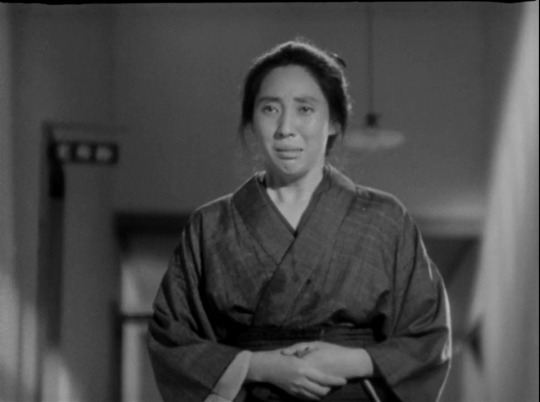
Mitsuko Yoshikawa in A Mother Should Be Loved (Yasujiro Ozu, 1934)
Cast: Mitsuko Yoshikawa, Den Ohinata, Koji Mitsui, Seiichi Kato, Shusei Nomura, Shinyo Nara, Chishu Ryu, Yumeko Aizome, Shinobu Aoki, Choko Iida. Screenplay: Kogo Noda, Tadao Ikeda, Masao Arata, Yasujiro Ozu. Cinematography: Isamu Aoki.
Ordinarily, I would regard watching a silent movie about mother love as a chore, not a pleasure. Especially if the movie is missing its first and last reels and doesn't have a music soundtrack to sweeten it. But A Mother Should Be Loved is an exception, mostly because it's directed by Yasujiro Ozu, who can be trusted not to slip into mawkishness and also to provide visuals that compensate for what's lacking in audibles. The story is emotionally complex: After the death of their father -- a role, played by Yukichi Iwata, that was lost with the movie's first reel -- Sadao (Seiichi Kato) and Kosaku (Shusei Nomura) are raised by Chieko (Mitsuko Yoshikawa). But when Sadao comes of age (now played by Den Ohinata) and applies to the university, he sees his birth certificate and realizes that Chieko is not really his mother -- he's the son of his father's first wife. He's upset at the deception but is quickly assured by Chieko that she loves him equally with Kosaku (now played by Koji Mitsui) and has tried to raise him as her own son. Eventually, however, Sadao suspects Chieko of overcompensating: treating him more generously than Kosaku. They argue, and when Kosaku learns that Sadao has upset their mother, he strikes him. Unwilling to fight back, Sadao leaves home and takes up residence in a brothel. When Chieko comes to plead with him to return home, Sadao refuses at first, but a maid in the brothel overhears their conversation and tells him her own story, which moves him so much that he relents. The reconciliation scene has been lost with the last reel, but is narratively inessential -- if the loss of any of Ozu's work can be deemed inessential. The delicacy of the performances and the lovely framing of each scene in the film overcome sentimentality. Ozu also slips in one of his allusions to other movies by decorating the brothel with a poster of Joan Crawford as Sadie Thompson in Rain (Lewis Milestone, 1932).
0 notes
Photo










The Ball at the Anjō House / Anjō-ke no butōkai (1947, Kōzaburō Yoshimura)
安城家の舞踏会 (吉村公三郎)
2/14/18
#40s#Japanese#The Ball at the Anjo House#Setsuko Hara#Osamu Takizawa#Yumeko Aizome#Kaneto Shindo#drama#rich people#post war#mansion#aristocracy#class differences#families#stagey#suicide#father and daughter#gendai-geki
5 notes
·
View notes
Photo


Yumeko Aizome (逢初夢子), Kimiyo Otsuka (大塚君代) and an unknow lady. 1934
93 notes
·
View notes
Photo










Films watched in 2019.
#229: The Ball at the Anjo House (Kôzaburô Yoshimura, 1947)
★★★★★★★☆☆☆
#films watched in 2019#The Ball at the Anjo House#yoshimura#1947#siete#Anjô-ke no butôkai#anjo-ke no butokai#setsuko hara#kozaburo yoshimura#Kôzaburô Yoshimura#black and white#drama#family#guns#Yumeko Aizome#Osamu Takizawa#Masayuki Mori#Akemi Sora#Keiko Tsushima
84 notes
·
View notes
Text
AnjГґ-ke no butГґkai Movie To Download Full
AnjГґ-ke no butГґkai movie download
Actors:
Shin'ichi Himori Yumeko Aizome Michiko Ikuno Masayuki Mori Masao Shimizu Keiko Tsushima Chieko Takehisa Setsuko Hara Osamu Takizawa Takashi Kanda
Download AnjГґ-ke no butГґkai
Actors: Shinichi Himori, Chieko Takehisa, Michiko Ikuno, Keiko Tsushima, Masao Shimizu, Takashi Kanda, Osamu Takizawa, Masayuki Mori, Setsuko Hara, Yumeko Aizome. 安城家の舞踏会 Anjke no Butkai (1947): パソコン映画館安城家の舞踏会 ★ Anjke no Butkai (1947). Anj-ke no butkai was made in 1947 by director Yoshimura, Kozaburo. . Full Anj-ke no butkai movie downloadsAnj-ke no butkai was made in 1947 by director Yoshimura, Kozaburo. jmdb · goo映画 · DISCAS · みんなのシネマレビュー · 安城家の舞踏會. The Ball at the Anjo House 1947, Kozaburo Yoshimura Wonders in. In the Japan of the post WWII American. 監督:吉村公三郎. Full Anj-ke no butkai movie downloads | Download famous films. Anj-ke no butkai. Actors: Shinichi Himori, Chieko Takehisa, Michiko Ikuno, Keiko Tsushima, Masao Shimizu, Takashi Kanda, Osamu Takizawa, Masayuki Mori, Setsuko Hara,. 収録時間:90分. It took me over a decade to track down a subtitled copy, which speaks volumes in itself. p Takeshi Ogura d Kozaburo Yoshimura w Kaneto Shindo story Kozaburo Yoshimura ph Toshio Ubakata m Chuji Kinoshita art Tatsuo Hamada. レンタル開始日:2008-06-27. 出演者:原節子、 滝沢修、 森雅之、 津島恵子. A fallen monkey keeping up the show. Take Heinosuke Gosha, better still take Kozaburo Yoshimura and the film commonly seen as his masterpiece, The Ball at the Anjo House
Teito monogatari gaiden hd Company Business online Phir Kabhi divx
#AnjГґ-ke no butГґkai#Shin&x27;ichi Himori#Yumeko Aizome#Michiko Ikuno#Masayuki Mori#Masao Shimizu#Keiko Tsushima#Chieko Takehisa#Setsuko Hara#Osamu Takizawa#Takashi Kanda
1 note
·
View note
Photo










Minato no nihon musume (Hiroshi Shimizu, 1932)
1 note
·
View note